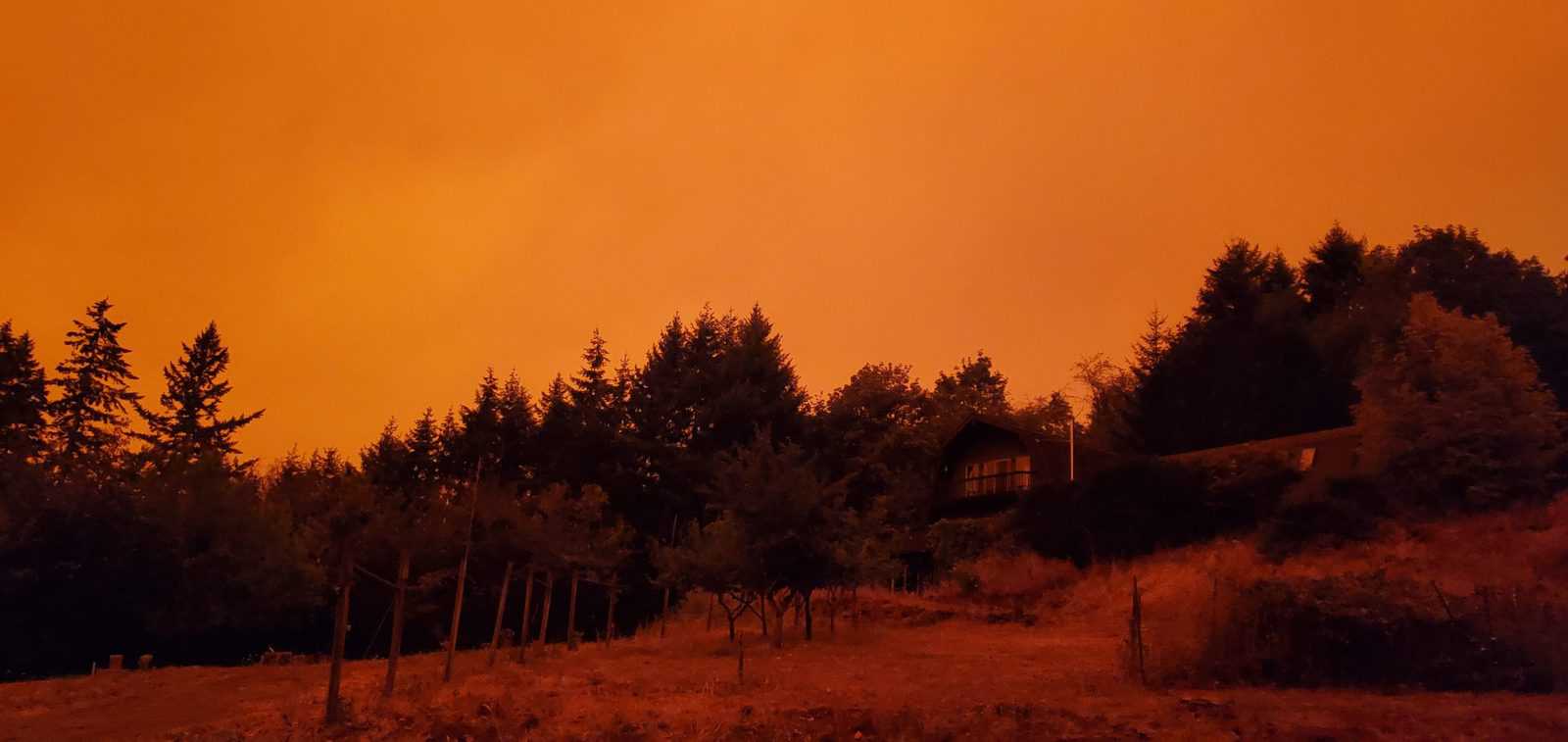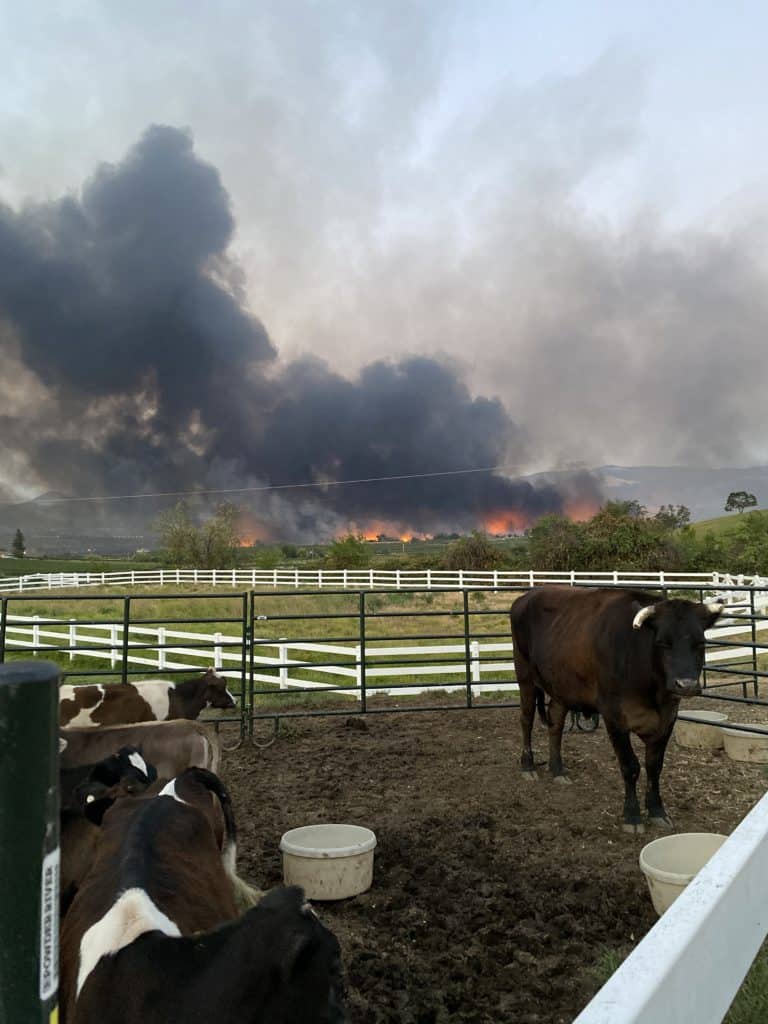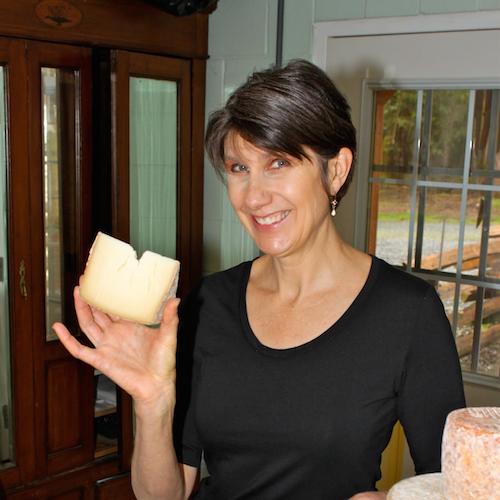
No one can argue that 2020 has been an easy year for cheesemakers—or for anyone. The pandemic and its consequences for small businesses in particular have been brutal. In the West, just as things were starting to gain some traction, we were hit with record-breaking wildfires. As I write this in early October, it is still so smoky here in southern Oregon that I cannot see the mountain that is our usual view. Here’s a look at the experiences of four Oregon cheesemakers, with a few encouraging moments revealed even as the smoke concealed so much else.
Rogue Creamery
About 10 miles southeast of Rogue Creamery, the conjoined towns of Phoenix and Talent saw an apocalyptic loss of nearly 3,000 homes, businesses, and apartment buildings in the horrific Alameda fire. Included were the homes of four creamery employees. President David Gremmels, who lives in the foothills along which the fire sped, not only had to evacuate himself, but also 19 heifers—the next generation of Rogue’s dairy herd—along with their huge companion ox, Blue.

The fire had other consequences for the almost 90-year-old business, including the always anticipated annual release of its award-winning and incredibly yummy Rogue River Blue cheese. The release is timed for the Autumnal equinox, and 2020 was no exception. But because the local airport was closed for more than 10 days, some 1,000 orders that had gone out on time were delayed, causing the cheese to arrive in poor condition. Those orders had to then be reshipped.
In keeping with its many decades of community support, the creamery is helping feed the over 4,000 people who lost their homes by donating about 1,000 pounds of Touvelle cheese every week. Rogue Creamery’s partner company, Savencia Fromage & Dairy, has pledged to match funds in a GoFundMe campaign that is raising money for the team members who lost their homes. For the time being, the creamery has housed them in a guest cottage on the property and in an improvised apartment in the equipment shed.
Briar Rose Creamery
Tucked alongside the famed vineyards of Dundee, Oregon, Sarah Marcus and Jim Hoffman’s creamery, Briar Rose, was forced to evacuate hundreds of pounds of cheese due to a power failure from the epic windstorms that threatened to spread the Bald Peak fire, four miles away. Their cheesemaking building and home were not in the immediate evacuation zone, but without water and power they were unable to keep their inventory of cow’s milk cheeses on-site, much less themselves.
Unsure what to do, the couple popped into town for breakfast where the chef overheard their dilemma and immediately offered any free cold storage space they had. After filling the restaurant’s shelves with 25 five-gallon buckets of feta, they were still a long way from finished. The bistro across the street, along with another restaurant, immediately stepped up and after many trips with ice chests, 250 wheels and 40 five-pound bags for fromage blanc, plus cultures and rennet were all safely stowed.
After two days, Jim and Sarah were able to locate a small generator to power a few other essential storage areas that they had not been able to empty. During that time, a spot fire erupted only a half-mile away, but was put out quickly.
In the meantime, many miles and another fire away, the dairies from which Briar Rose sources the Guernsey and Ayrshire cows’ milk for their cheeses were directly in the line of the massive Beachie Creek fire (which currently has burned just under 200,000 acres). Both farms, each with about 250 cows, were told to evacuate; however, in classic, salt-of-the-earth, dairy-farmer style neither budged. It helped that two farmers at one farm are volunteer firefighters, and that both farms are surrounded by lush, green pastures and low fuel opportunities for fires. Still, the cows all suffered from the heavy smoke, resulting in a temporary drop in milk production. Several calves also died from pneumonia brought on by breathing the particulate-laden air.
Goldin Artisan Cheese
When cheesemaker Carine Goldin moved to the United States from France and dreamed of opening her own goat fromagerie, she never imagined that one of the biggest challenges she and her operation might face would be a wildfire. Located in Molalla, just south of Portland, the 85-goat dairy got the call to “leave now” on the evening of the second day of the rapidly growing Riverside fire.With only a Subaru and Kia at their disposal, Carine and her partner, Juan Mejia, loaded their dogs and cats into pet carriers and headed to a friend’s home. After a sleepless night in their cars they started trying to locate transportation and somewhere to move the goats.

Seven goats being driven to safety in Carine Goldin’s Subaru wagon
A utility trailer and the small cars made two trips later that day, moving all of the goats save for two bucks (which, thanks to it being breeding season, cannot share space with the female goats—at least not without consequences) to a safe place. The gentlemen had a private trip to safety the following day. Then things changed. The largest fire merged with a smaller fire, and where they had taken their goats became a Zone 2—the level right before “leave now.” In addition, Carine was trying to hand milk 30 goats—trust me, not an easy switch to make from machine milking.
Three days after the first evacuation, Carine received two phone calls that improved life for both her and the goats. The first was from the Oregon Department of Agriculture—the regulatory agency that inspects the state’s dairy and cheese facilities—who offered help with providing trailers and people to move the animals to safety. Then another Oregon creamery, Fraga Farmstead, called and not only offered to house the goats, but also to put them right into the line-up and milk them with their own goats.
Twelve days after the first alert, Carine and the goats were back at the farm—still in Zone 2, but with a realistic chance of improvement. Her does were exhausted and stressed, but have now mostly recovered. She only lost one batch of cheese, the one she was in the middle of making when they were told to leave. Oh, and if you are wondering how many goats you can fit in a Subaru wagon—the answer is seven.
Portland Creamery
Not far from Goldin in Molalla is Portland Creamery, owned by Shawn Fels, and the dairy goat farm of Lauren Acton and John Wright that supplies the creamery with milk. The Riverside fire, which as of this writing is only 60-percent contained, came within one-and-a-half miles of the dairy and creamery. Acton and Wright moved the goats on the first day, relocating them to the Clackamas County Fairgrounds. The next day, another friend in the dairy business offered to take the goats into her herd in eastern Oregon where they could be easily milked.
As a precaution to prevent new fires during the historic wind event with gusts up to 50 mph, electricity to the property was shut off by the power company. There was no time to move cheese or supplies, including the previous day’s batch of draining chèvre. When the team was allowed back in, 11 days later, they were met by big bags of super dry cheese suspended in mold-covered cloth. Including that batch, over 600 pounds of cheese was lost as well as many perishable ingredients.
Thanks to Lauren and John’s preparedness, there was no drop in milk production and the ladies all returned to the farm in fighting shape. Shawn said that they used the opportunity of the ruined draining cloths to switch to a new draining system that they had been wanting to implement. Like Carine, he also received a call from the ODA offering assistance, which, although not needed, was “such an encouraging thing—something you’d never expect from a regulatory agency,” he says.
The Future
Wildfires have always been a part of Western ecology, but what was once a beneficial, integrated part of nature has been transformed into something dire. This year’s crisis has been exacerbated by more than a century of logging and controversial forest management, the massive increase in population—both living in the forests and canyons and using them for recreation—and, of course, the looming specter that is climate change. How we deal with it remains to be seen, but I know we can count on one thing: communities helping each other when the worst happens. With your next slice, wedge, shave, or sprinkle of artisan cheese, please raise a glass to all of the indomitable cheesemakers, dairy farmers, cheesemongers and others that refuse to give up.




